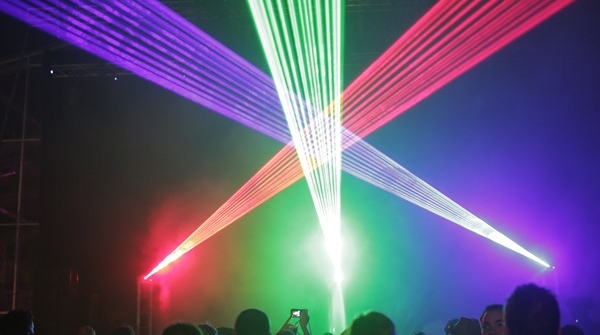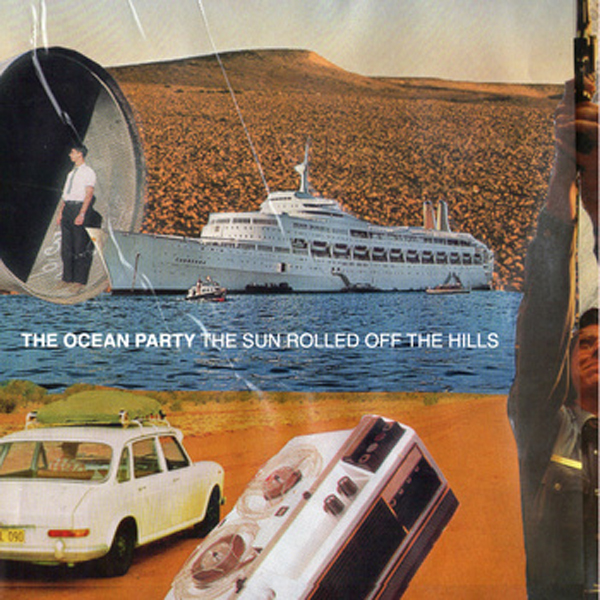But no. It turns out that the lasers Fox is bringing to Melbourne Music Week are a little different. “I’m doing the RGB laser show,” he tells me, destroying my dreams while simultaneously talking about some pretty cool stuff. “It’s an audio-visual piece where you see and hear the same electrical signal at the same time. I use three very tightly focus lasers, one red, one green and one blue. Each is describing a geometry and space which is also translated into a sound. The electrical signal that you see is the same electrical signal that you hear. The idea is that it creates a kind of artificial synaesthesia.”
Synaesthesia is derived from the Greek words syn – ‘together’ – and aesthesis – ‘sensation’ – and describes a neurological phenomenon whereby stimulation of one pathway in the brain leads to involuntary automatic experiences occurring in another part of the brain. “I think the RGB show has been getting a lot of traction because it cuts this fine line between being a gig and being a spectacle,” muses Fox. “It’s not like a corporate laser show, it’s actually a gig, but it has all the appeal of a large scale audio-visual spectacle. It’s designed to create an ecstatic experience for people. It connects these parts of the brain, the visual cortex and the aural cortex.”
“Most people are pretty shocked by the show. It is pretty intense, sound-wise. It occupies a sound world that a lot of people wouldn’t spend time in. I come from an experimental music and noise background. Some people are really interested in it and really get into but generally find it kind of hard to take. What I found when I started to do these synaesthetic things is that people would stay for the entire gig of sound they normally wouldn’t listen to, but they’re drawn into it by how the audio and visuals are bound together.”
“I’ve got a few theories about what happens. I think that the relationship between sound and image bypasses the rational brain. It’s more like your limbic system dealing with it, it’s more like an instinctual response rather than a rational response, People sometimes have irrational responses to the work, they’ll just kind of flip out in a way. People have called it the equivalent of taking psychedelic drugs without the drugs, and that’s great. If you can have good clean fun like that with lasers, that’s awesome.”
“I came across one guy in Canada who said he was a Vietnam veteran. He told me (the show) was the closest he’d come outside a combat situation to actually feeling under fire. I thought that was a pretty intense analogy. People often talk about being transported by it, being mesmerised and transported to another place. Space and time kind of collapses for a little while and that’s excellent. It’s pretty abstract for a piece of artwork. There’s no message. It’s not even particularly musical some of the time, it’s just sound and light.”
“I have been a student of experimental music for a very long time,” explains Fox when I ask about what inspires him to do what he does. “The birth of electronic music was really a radical form. Now we just accept it because it’s everywhere, but when it started out it was people making sound by cutting up and re-joining bits of magnetic tape, and recording the sound of trains and toilets flushing and stuff like that. It was a really exploratory thing. What I think is brilliant about experimental music is that it’s not about the product, it’s not about what you’re producing, it’s about the process you use to get there. So it’s about asking a series of questions I suppose. When I’m making things for me the question is ‘what would happen if I did X, Y, and Z?’ And sometimes it’s really interesting and sometimes it’s a bucket of shit and you’ve just got to accept that.”
It seems that, for Fox, it’s turning out more interesting than not. While we talk he mentions upcoming shows in Hamburg, Krakow, massive festivals across the world. “I do get to see a lot of different festivals,” he agrees. “MONA FOMA particularly is a pretty radical one on the Australian calendar, partly because of its independence from government it feels like . I mean Melbourne Music Week is amazing because it is Melbourne City Council running it. It’s amazing local government is running a festival like Melbourne Music Week, it’s kind of incredible. But MONA FOMA has this curatorial madness about it because MONA itself is based on the vision of a crazy man really, an individual. For me they’re on a par with the festivals I go to internationally.”
BY JOSH FERGEUS

